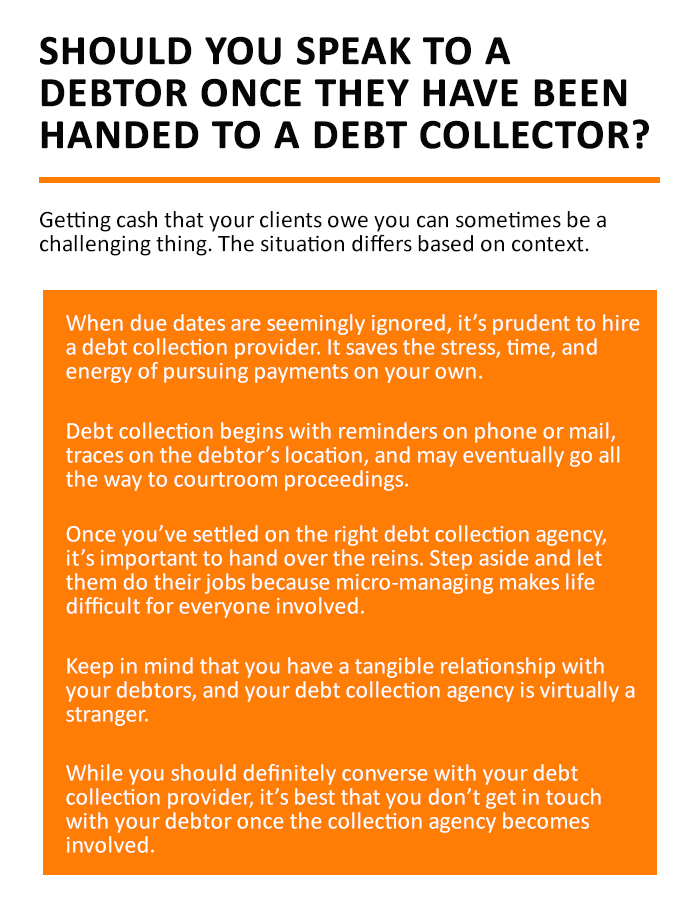Getting cash that your clients owe you can sometimes be a challenging thing. The situation differs based on context, of course. For example, if you’re a bank or credit card company, then you’re claiming physical cash that customers had borrowed. If you’re a product or service provider, then it’s payment for something your customer has already used.
When due dates are seemingly ignored, it’s prudent to hire a debt collection provider. It saves the stress, time, and energy of pursuing payments on your own. Be sure to hire the right agency though. You don’t want underhanded shifty types that will terrify your clients into paying. They may be effective, but they do more harm than good.
Why? Because they will affect your reputation and your perception in the eyes of customers. Testimonials are often the best way to gain new customers, so if possible, get your debts paid in a civil way. In this social media age, all it takes is one photo of an intimidating person banging the door at odd hours to virally destroy your brand image.
Debt collection begins with reminders on phone or mail, traces on the debtor’s location, and may eventually go all the way to courtroom proceedings. These legal dealings aren’t necessarily handled by your corporate lawyers, so it helps to find a collection agency that partners with a law firm. It improves efficiency and lowers cost.
Once you’ve settled on the right debt collection agency, it’s important to hand over the reins. Step aside and let them do their jobs because micro-managing makes life difficult for everyone involved. This doesn’t mean you shouldn’t be involved at all. It’s crucial to see your dealings with your debt collection provider as a partnership.
Check in with your debt collectors on a regular basis. When you first hire them, have a meeting to go over expectations and terms of reference. It may help to have a review session every week or so to see how things are going. You should also make yourself available on phone or email in case your debt collectors need any clarification or information.
Keep in mind that you have a tangible relationship with your debtors, and your debt collection agency is virtually a stranger. This can be an advantage to the debt collector since they are unbiased and can take an objective approach to any customer dealings. However, the nature of your customer relationship can benefit your debt collectors.
For example, you might know your debtor’s family situation, work terms, or earning potential. All this is crucial information that can help your debt collector work out a new payment solution, so be sure to stay in touch with your collection agency and offer them any pertinent details. Create a comprehensive profile or dossier of their collection target.
While you should definitely converse with your debt collection provider, it’s best that you don’t get in touch with your debtor once the collection agency becomes involved. This will dilute the authority of the agency, and could turn into a situation where the debtor plays their creditor against their collector. Make it clear that there’s a single chain of command.
When you first hire the debt collection agency, it’s important to let your debtor know about the agency. Send the debtor an official letter letting them know that you have handed over their debt to a collection agency. Let the customer know that further interaction will go through the agency, and give them a contact person. Copy the agency in this communication.
Be careful to make the tone of your letter non-threatening. As much as possible, keep it formal and clear without triggering your debtor to attack or run. After this notification, your debtor might still try to contact you directly. They might think you are less assertive than your debt collector, or that you are easier to reason with.
Your debtor may even appeal to your previous personal dealings with them. If the communication is by email or letter, respond to the debtor informing them that you will no longer respond to their emails and that you’d prefer they deal directly with the collection agency. Copy the agency in the message, so they are in the loop.
If the debtor continues to email you, don’t ignore the message. Simply forward the message to the collection agency, making sure the debtor is aware that you have forwarded it. Via email or text message, this is easy to do, since you can just forward the message to the agency, CC-ing, the debtor without including your response.
If the debtor calls you, don’t take the call, and if they come to your office, have your receptionist let them know – politely – that all future dealings must go through the collection agency. You may be tempted to step in, but it only makes life harder for your debt collector.
Just like all your employees and suppliers, you have hired your debt collection provider to do a job. It helps to take a step back and give them room to do that job effectively.
Related Articles:





